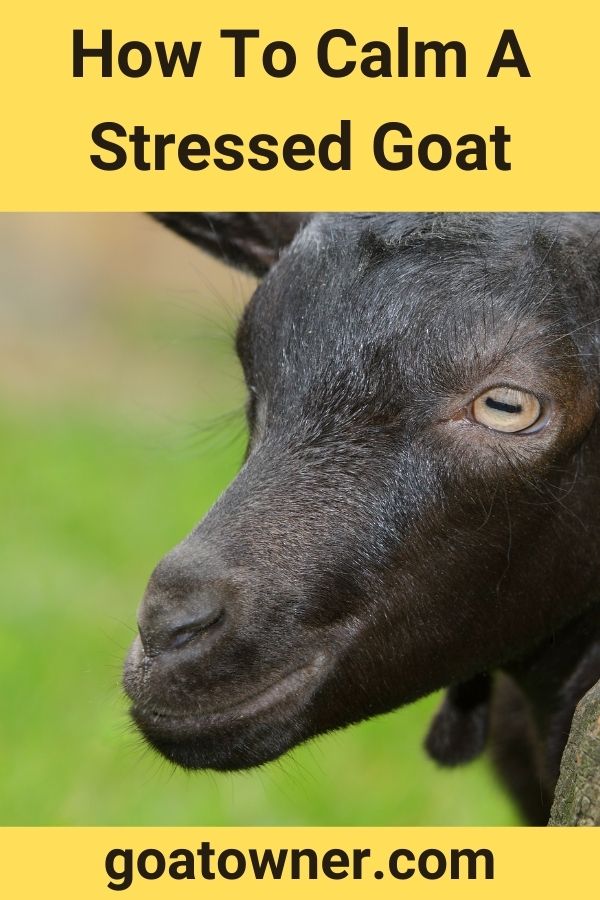One of the biggest challenges of being an animal owner, of any kind really, is doing your best to reduce their stress.
While their everyday life might be blissful and idyllic, there are sometimes unavoidable periods of stress where we must strive to calm them down.
Recently, I was moving my goats across the country, and I had to take a lot of measures to make sure they all stayed calm for the journey.
A friend of mine asked me how I managed to keep them calm—this is what I told him.
So, how to calm a stressed goat?
It starts with your everyday behavior. Work quietly, calmly, and make sure that they have all their needs provided for to prevent stress in the first place. For an actively stressed goat, be near it, calm it with your voice, and pet and scratch its belly—just make contact in a gentle way.
So, the best way to calm a stressed goat is to do your best not to let them get stressed in the first place.
Obviously, however, there are times when it’s unavoidable.
Knowing what to do in those situations before they arise is the next most important thing.
Let’s look further into this.
How do you comfort a goat?
For a goat that is already stressed out, there are a couple of primary ways you can comfort them.
They are best used in tandem where possible.
Firstly, it’s about physical contact.
Depending on your relationship to the goats, of course—if you seem to be making them more nervous, back off and give them space.
For the most part, though, goats will be comforted by contact with you.
You can pet and stroke them, or even just be near them for a few minutes.
They like to have their stomachs, chest, and ears scratched, so start there.
Being vocal is also a really important part of this.
Goats are herd creatures, and thus very vocal pretty much all the time.
Use your voice to soothe the goat and remind them of your presence.
Speak in a soft, low voice, and try to soothe them this way by just reminding them you’re there.
The other main thing you can do is to distract them with food.
If you are transporting them, for instance, which is often very stressful, you should have snacks on hand to give them as treats.
This will distract and calm them down, and make them feel better.
You’re also going to need to look at reducing the stress in the first place.
Related – Do Goats Like To Be Petted? (Find Out!)
How do you reduce stress in goats?
There are many ways you can combat a goat’s stress in its everyday life.
Most days, you will probably need to come out onto their pasture to do work.
When you do, and they are around, it’s important that you work calmly and quietly.
Stress can build up over time from lots of noise and hubbub around them.
Make sure they are provided with all the facilities they need.
They will need shade from the heat, shelter from the cold, and of course fresh, clean water and fresh food every day.
As long as they are never worried about any of these things, the instances of stress will be reduced hugely.
Make sure your goats aren’t overcrowded.
If you have too many in a small space, this will inevitably lead to stress.
They need a clean, well-ventilated environment.
Dust and other forms of debris will hugely increase their stress levels.
What causes stress in a goat?
There are many things that can cause stress in goats.
The main things are going to be lack of basic needs—no clean water, poor ventilation, poor hygiene in their pasture and enclosure.
The other thing is going to be your behavior.
Make sure to always be calm and quiet around your goats, and not to cause them stress just by being too loud or making too much fuss.
Goats are also inherently social herd animals, and they will become stressed if they are isolated from other goats.
You cannot have a single goat on its own—you need to own several.
This is a leading cause of stress in goats with owners who don’t know better.
What are the signs of stress, then?
How can you tell if a goat is unhappy?
Goat body language is easier to read than you might imagine.
One of the main things to look for is their tail.
If they are apprehensive, or even just unhappy, their tail is likely to be tucked between their legs, and not moving at all.
On the other hand, a wagging tail often indicates happiness.
They are also much more likely to bow their head than raise it up if they are unhappy.
If they refuse to leave the enclosure and don’t want to roam the pasture, this is a very bad sign.
In this case, you should take a deal of time with the goat to identify what the problem is.
Goats are complex emotional creatures, then, and they are just as prone to stress and emotional concern as dogs are.
You need to keep this carefully in mind when you are rearing goats, as you can’t expect them to just look after their own emotional state.
There are many things you can do to prevent the risk of stress in the first place, and this should be the first thing you think about.

